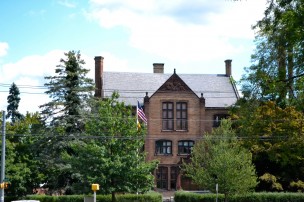
This past spring, the Wesleyan Student Assembly (WSA) passed two resolutions, both geared toward eradicating sexual assault in fraternity houses but each with different strategies. On April 21, the assembly passed Resolution B, which calls for the fraternities with houses on campus to become coeducational; on May 3, it then passed Resolution D, recommending increased regulation of Greek life on campus. Since then, members of the University have been evaluating the steps that should be taken moving forward.
Resolution D elaborated upon the suggestions made in B, calling for the creation of an Office of Greek Life, Greek Life Safety Standards, and a Greek Life Judicial Board, which would discipline and police members of Greek organizations in addition to the Student Judicial Board (SJB).
“[The WSA] calls upon the Wesleyan administration to renew program-housing status to any currently housed fraternity that, by the end of Fall 2014, becomes co-educational in constitution and demonstrates a clear and swift plan of action to become substantively in membership and residence, beginning with an initial co-educated pledge class in Spring 2015,” Resolution B reads.
At the beginning of the summer, Roth discussed both resolutions with the Board of Trustees. In August, Roth said that after much discussion, the Board asked him to receive more input on the issue before the next meeting in September, at which point a decision will likely be made.
“I’ve been thinking about it according to two axes,” Roth said. “The first has to do with equity and inclusion, and the second has to do with safety and risk. I will be talking to the Board about principles involved in regards to equity and inclusion and then the practicalities of safety and risk.”
Roth spoke about the progress the University has made with regard to sexual assault policy following the student uproar in the spring.
“I think we’ve made real progress in creating a system where a survivor of a sexual assault will get the support that person needs and also have a process that is respectful and fair to the survivor and fair to whoever is accused, being the perpetrator,” Roth said. “I think that awareness that this is something to be reported rather than something to be hidden is really key.”
Terence Durkin ’16, President of Delta Kappa Epsilon (DKE), believes that DKE is becoming better equipped to deal with sexual assault and attempting to become a space where all students on campus feel safe.
“The brothers of DKE are ready to be leaders in creating a safer and more secure campus,” Durkin wrote in an email to The Argus. “Regarding the issues of sexual assault and binge drinking, we have taken steps to set up and fund professionally led sexual assault and alcohol abuse awareness programs.”
Beta Theta Pi (Beta), too, has made changes for the coming year.
“We plan to have designated sober brothers at every function we hold,” Beta president Niall Devaney ’16 wrote in an email to The Argus. “These brothers will act as contacts for any visitor who needs help with any situation. Further, last year we began to hire outside security guards who help ensure that not only our house rules are being followed, but that everybody in the space is as safe as possible.”
Both Niall and Durkin also mentioned that Greek life housing is now accessible by Public Safety, unlike in the past.
Other fraternities were contacted for comment but did not respond before the publication deadline.
Roth addressed the paradox that reported sexual assaults pose on campus.
“I would much prefer that there were no sexual assaults at Wesleyan, but if there were no reports about sexual assaults, I would really think that we were simply ignoring something that was happening, and so the fact that there are reports gives me courage to think that we have a better chance of eradicating sexual assault because people are willing to deal with it rather than hide it,” Roth said.



Leave a Reply